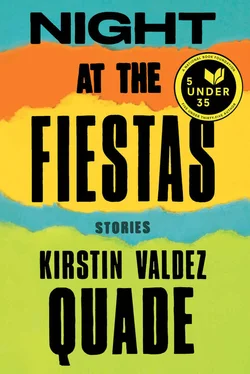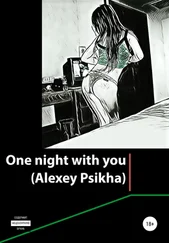“So,” Amadeo says. “Your mom’s probably gonna want you back soon, no?”
“Nah. I’m staying here with you and Gramma awhile. I gotta teach her she’s not the only one in my life.”
Amadeo kneads his thigh. He can’t tell her to leave. Yolanda would kill him. He just wishes that Yolanda were here.
She and Angel are pretty close; Yolanda sends the girl checks, twenty-five here, fifty there, and a couple of times a year the two go shopping at the outlets near Santa Fe. Amadeo tries to remember the last time he was alone with his daughter, but can’t. Two or three Christmases ago, maybe; he remembers sitting awkwardly in this same room asking Angel about her favorite subjects while Yolanda was at the grocery store or the neighbors’.
Amadeo is having trouble breathing. “Maybe you could visit when my mom gets home.” A needle of guilt slides into his side.
Angel doesn’t seem to have heard him. “I mean, the woman’s all preaching to me about how I messed up and why couldn’t I learn from her mistake, but what am I gonna do now, huh? I mean, I get it. It’s gonna hurt like hell and I’m missing prom and did you know I probably won’t get to sleep a whole night until it’s three years old? I’ll be eighteen by then.”
Angel looks like her mother. Amadeo doesn’t remember Marissa acting this young back then. Marissa was sixteen, Amadeo eighteen, but they felt old, he is sure of that. Her parents had been angry and ashamed, but had thrown a baby shower for the young couple anyway. Amadeo had enjoyed being at the center of things: congratulated by her relatives and his, handed tamales and biscochitos on paper plates by old women who were willing to forgive everything in exchange for a church wedding. He stood to sing for them, nodding at Marissa: “This is dedicated to my baby girl.” Bendito, bendito, bendito sea Dios, los ángeles cantan y daban a Dios. They all clapped, the old ladies dabbing their eyes, Yolanda blowing kisses across the room.
Later, of course, after there was no wedding, no moving in together, after Angel was born and learned to walk and talk — with no help from Amadeo — he was relieved by how easily the obligation slipped from his shoulders. The old women shook their heads, resigned; they should have known better than to expect anything from Amadeo, from men in general. “Even the best of them aren’t worth a darn,” his grandmother used to say. (“Not you, hijito,” she’d say kindly to Amadeo. “You’re worth a darn.”) By the time Angel was five and Amadeo had moved with his mother back to the little town where he’d grown up and where their family still lived, he felt lucky to have been let off the hook.
As though answering a question, Angel says, “I didn’t drop out of school for real. I’m gonna start back up after the baby comes, so don’t worry.” She looks at him, waiting.
Amadeo realizes that he forgot to worry, forgot even to wonder. “Good. That’s good.” He gets up, rubs his shorn head with both hands. “You got to have school.”
She’s still looking at him, demanding something: reassurance, approval. “I mean, I’m serious. I’m really going back.” Then she’s off, talking about college and success and following her dreams, the things she hears at the parenting class she goes to at the clinic with other girls her age. “I got to invest in myself if I’m gonna give him a good life. You won’t see me like my mom, just doing the same old secretary job for ten years. I’m doing something big.” She turns to her belly. “In’t that right, hijito?”
This depresses the hell out of Amadeo. He opens a beer and guzzles half of it before he remembers who he is this week. “Fuck,” he says, disgusted with himself, and pours it down the drain.
Angel looks up at him from the couch. “You better clean up your mouth. I don’t want him hearing you say that. He can hear every little thing you say.”
“Fuck,” Amadeo says again, because it’s his house, but he says it quietly, and thinks about the sound passing through his daughter’s body to the child inside.
THE TEACHER OF ANGEL’S parenting class has arranged for someone to drive her into Española at two-thirty every afternoon. Angel is up by seven. Amadeo can hear her, clattering dishes, the TV going. Midmorning, she’s in the shower. The pipes hiss and gurgle in the wall near his head. He flops over in his limp bed, tries not to think of her, the naked lumps of flesh, but he can’t help it. Christ’s pain , he reminds himself. Think of that. Each day, Amadeo practices his face in the bathroom mirror after he showers, water running down his forehead. He spreads his arms, makes the muscles in his face tighten and fall, tries to learn the nuances of suffering. To think of his daughter makes him queasy. It makes him queasier to think about whoever got Angel this way. This is not a detail that made it into the story Amadeo heard from his mother, but he doesn’t need facts to picture it: some Española cholo dealing meth from the trunk of his lowrider. When he finally hears Angel leave, Amadeo gets up. He watches from the kitchen window until the teacher’s car is out of sight, then sinks into the chair in relief and eats the cold eggs and bacon she has left out for him.
He’s on the couch with a Coke and the remote balanced on his thighs when Angel comes home. As she swings her backpack to the linoleum, she looks at him, surprised. “Aren’t you working?”
“It’s Holy Wednesday,” he says.
“Where you working now?”
“It’s slow. I’m waiting to hear.”
“Huh.” Angel drops to the couch, then scoots down so her neck is cricked and her belly high.
Who is she to criticize? “I’m getting something together with Anthony Vigil. We’re doing a business, outfitting cars for the races down in Albuquerque.” Actually, this was the plan — Amadeo enjoyed working with Anthony, and was good at it, reboring the engine, replacing the metal front and sides with fiberglass, removing what wasn’t essential. Yolanda had been glad that Amadeo was “getting involved” and had offered to give them what she could afford to start them out. But in the end Anthony partnered with his cousin. “No offense, man,” Anthony told Amadeo, “but in a business you gotta know your partner’s going to show up.”
“Huh,” Angel says again. After a moment, “You still sing ever?”
“Nah.” Not for years, though at one time he’d thought he could actually go somewhere with it. He’s grateful to Angel for remembering; Amadeo offers her his Coke.
She shakes her head. “It’ll dissolve his baby bones.”
From eleven on, Angel was a little shit: surly, talking nasty, applying dark lip liner like she was addicted to it. Amadeo remembers when she was younger; he looked forward to when she’d come from Española to stay with him and his mom, enjoyed taking her out for the day, showing her off to his friends. He felt like a good influence, teaching her how to check the oil and eat ribs and not to listen to Boyz II Men. She was sweet then, eager to please, riding in the truck, fiddling with the radio, asking him at each song, “Is this good? Do you like this one?” When he’d nod, she’d settle back and try to sing along, listening hard, each word coming a little too late. Sometimes Amadeo would sing, too, his voice filling the cab, and Angel would look up at him, delighted.
Now she resembles that child again — her cheeks full and pink — but there’s something frightening about her. It’s as though she’s reentered the world, proud to be a member in good standing. Now she regales Amadeo with facts she’s learned in her parenting class, facts about fluids and brain stems and genitals. “Like, did you know he had his toes before he even got his little dick?”
Читать дальше












